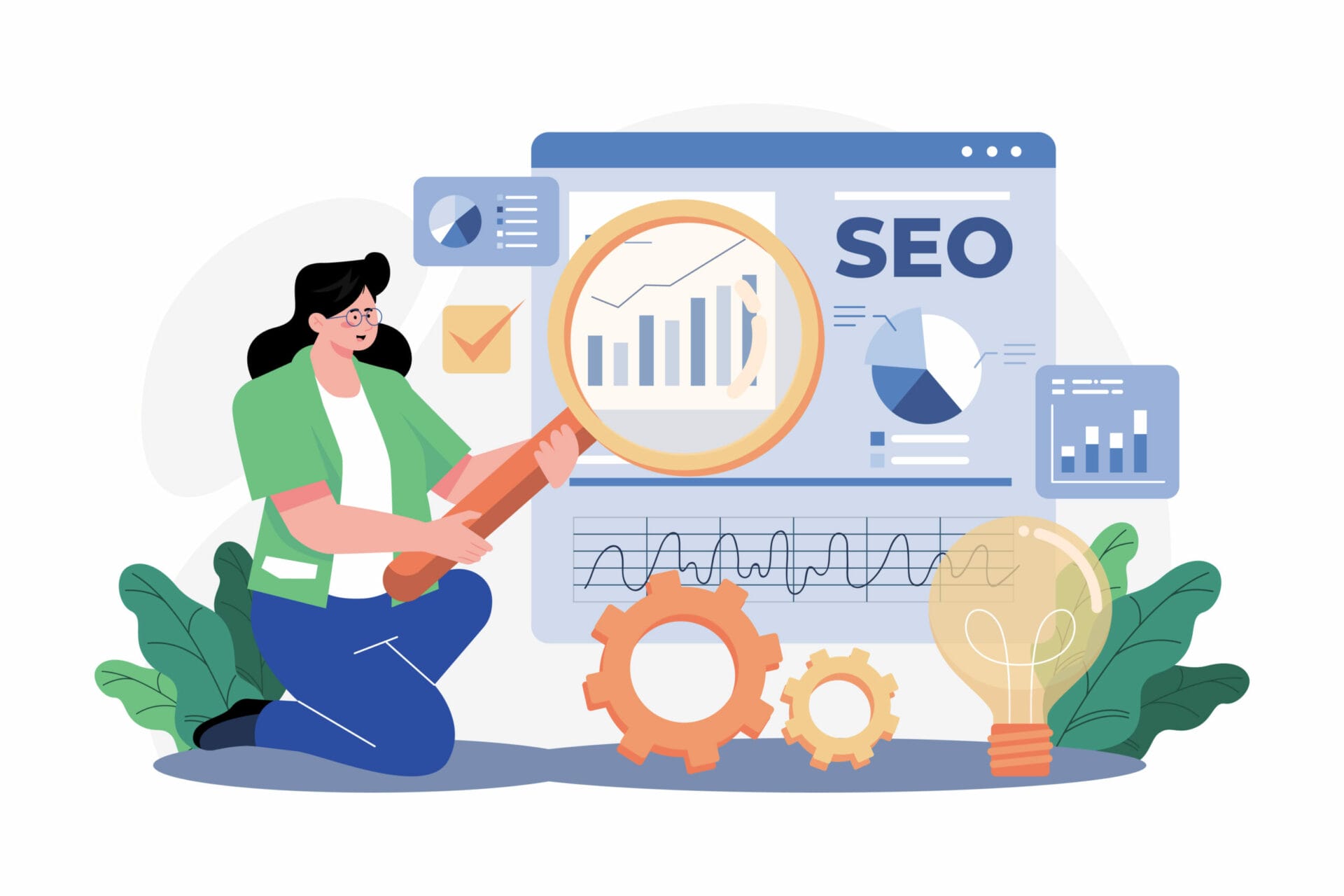Common SEO Mistakes to Avoid
Avoid Costly Mistakes Small Business Owners Make When Using SEO – Follow Our Essential Strategies and Practices Now
In today’s highly competitive digital landscape, search engine optimization (SEO) has become a crucial aspect for small business owners. Particularly those who aim to stand out and attract potential customers. However, not all businesses are well-versed in the intricacies of SEO. This can lead to costly mistakes that hinder their online visibility and growth.
This blog post is designed to help small business owners identify and avoid common SEO mistakes. Those who follow these tips ensure their website ranks higher in search engine results and appeals to their target audience.
From selecting the right keywords to optimizing site speed, we’ll guide you through essential strategies and best practices. These tips will help you make the most of your SEO efforts.
Choosing the Wrong Keywords
In the world of SEO, the importance of targeted keywords cannot be emphasized enough. They are the foundation of your online presence and the key element that helps your website rank higher in search engines.
Unfortunately, small business owners often make mistakes when selecting keywords, resulting in missed opportunities to reach their target audience. Some choose irrelevant keywords, while others opt for highly competitive ones. This makes it almost impossible for their website to stand out among the thousands of websites competing for the same traffic.
To avoid this pitfall, it’s essential to select the right keywords that resonate with your target audience and potential customers. Keep in mind that keyword research is an ongoing process that requires patience, persistence, and commitment.
By selecting the right keywords, you can increase your website’s visibility and attract more qualified traffic. Traffic that can be efficiently converted into leads and sales.
Keyword Stuffing and Over Optimization
Keyword stuffing is a common SEO mistake that small business owners should avoid at all costs. It refers to the practice of overusing keywords in an attempt to manipulate search engine rankings. This often results in low-quality content and poor user experience.
To avoid this mistake, focus on creating high-quality content with relevant keywords instead of simply trying to increase keyword density. Additionally, prioritize user experience by writing for your target audience rather than solely focusing on optimizing for search engines. This will help you create engaging content that resonates with readers and encourages them to take action.
By avoiding keyword stuffing and over-optimization, you can ensure your website ranks higher in search engine results. Plus, you’ll be providing valuable information to potential customers.
Need some tips on how to write better copy for your website? Check out our post: SEO Copywriting Tips That Work – For Real

Neglecting Page Title Tags and Meta Descriptions
Title tags and meta descriptions are essential components of SEO, as they provide search engines with important information about your website. Unfortunately, many small business owners make mistakes when creating these elements, leading to poor rankings in search engine results.
Common mistakes include duplicating title tags or leaving out crucial information such as keywords or product names. Additionally, some businesses fail to optimize their title tags and meta descriptions for both search engines and web pages. Unfortunately this results in a lack of visibility online.
It’s important to create unique titles that accurately describe the content on each page while including relevant keywords.
Furthermore, optimizing your title tags and meta descriptions for both search engines and web pages will help you stand out from the competition. It will also attract more qualified visitors who can be converted into leads or sales. By following these tips, you can avoid costly SEO mistakes that could hinder your online growth.
Duplicate Content Issues
Duplicate content is a common issue that can negatively impact SEO. It refers to the practice of having two or more web pages with similar or identical content. This results in search engines not being able to determine which page should be indexed and ranked higher. As a result, your website may suffer from lower rankings and decreased visibility online.
Fortunately, there are ways to identify and resolve duplicate content issues. One way is by using Google Search Console. Search consols allow you to view any potential errors related to duplicate content on your website.
Additionally, it’s important to check for any internal links that could lead visitors to multiple versions of the same page. This could also cause problems with indexing and ranking. Lastly, make sure all pages have unique titles and meta descriptions so search engines can easily distinguish between them.
Slow Site Speed and Load Time
Slow site speed and load time can have a significant impact on your website’s user experience and SEO. When a website takes longer to load, visitors are much more likely to abandon it before even engaging with the content. Ultimately, this causes a higher bounce rate and lower dwell time.
This can lead to poor rankings on SERPs as search engines take into account user behavior when evaluating a website’s relevance and authority. To avoid this common SEO mistake, it’s essential to optimize your website for faster loading times by compressing images, leveraging browser caching, and minifying code.
Another crucial factor is the server response time, which can be improved by using a reliable web hosting service. By taking these steps, you can give your website the best chance of attracting and retaining users, while also boosting its SEO ranking.
Want to learn more about improving your site? Check out this post: Improve Website Usability: Tips for Better User Experience
Ineffective Internal Linking
Internal links are an essential part of any SEO campaign, as they help search engines understand the structure and content of your website. Unfortunately, many small business owners make mistakes when creating internal links, such as using broken links or improper anchor text. This can lead to poor rankings in search engine results pages (SERPs).
To ensure your website ranks higher in SERPs, it’s important to create effective internal linking structures that include relevant keywords and properly formatted URLs. Additionally, use descriptive anchor text that accurately describes the linked page so visitors know what to expect when they click on it.
Lastly, check for any broken links regularly and update them if necessary to avoid hurting your website’s performance in SERPs. By following these tips, you can improve your internal linking structure while ensuring better visibility online.
Ignoring Mobile Optimization
Mobile optimization is becoming increasingly important in today’s search engine landscape. With more and more people using their mobile devices to access the internet, it’s essential for small business owners to optimize their websites for these devices. Unfortunately, many make mistakes with mobile optimization such as not having a responsive design or failing to resize images properly.
To ensure your website is optimized for mobile users, make sure you have a responsive design that automatically resizes itself depending on the device being used. Additionally, use high-quality images that are optimized for different screen sizes and resolutions so they don’t take too long to load.
Lastly, check your website regularly on multiple devices and browsers so you can identify any potential issues quickly and address them accordingly. By following these tips, you can improve the user experience while boosting your website’s visibility online.
Learn more by reading our recent post: The Importance of a Mobile-Optimized Website
Not Utilizing Google Search Console
By not taking advantage of Google Search Console, small business owners are missing out on a valuable resource that can greatly benefit their website’s SEO performance. One common mistake is not monitoring their website’s performance in SERPs, which can lead to missed opportunities for improved rankings.
Additionally, businesses may not be aware of potential duplicate content issues or if their site is not mobile-friendly, both of which can greatly impact search engine rankings. The good news is that getting started with Google Search Console is easy and free.
By simply verifying your website, you can access a wealth of data and insights that can help guide your SEO strategy and improve your website’s visibility in search results. Don’t miss out on the benefits of Google Search Console; start utilizing it today to boost your website’s SEO performance.

Unlock Valuable Insights into Your Website’s SERP Ranking
As a small business owner, it’s essential to take advantage of SEO in order to improve your website’s performance and visibility online. However, it’s important to avoid common mistakes that can hurt your website’s ranking such as ineffective internal linking or ignoring mobile optimization.
Additionally, make sure you’re utilizing Google Search Console so you can get valuable insights into your website’s performance in SERPs. By following these tips and implementing the suggestions outlined in this blog post, you’ll be well on your way to achieving higher rankings and improved visibility online.
To learn more about SEO and how you can use it to improve your website’s performance, contact one of our digital marketing experts today.
Now that you’re aware of the common mistakes small business owners make when it comes to SEO, you can unlock valuable insights into your website’s SERP rankings and start implementing strategies to boost your visibility online. Don’t wait any longer; start optimizing your website today!

